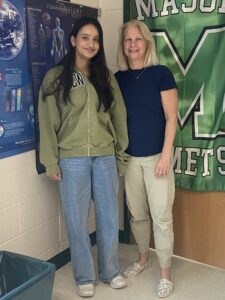Every January, William Mason High School in Mason, OH, hosts one of its biggest events of the year: the NHS talent show. It’s a fundraiser for community groups, and this year’s show raised almost $2,200 for the Lindner Center of HOPE’s treatment program for adolescents.
Organized entirely by members of the school’s NHS chapter, the show brings out diverse talent from across the school’s student body, ranging from the traditional singing and piano playing to more unusual acts like a Japanese yo-yo demonstration or a Bollywood dance group. Barbara Shuba, the school’s NHS adviser, and Riya Koul, the NHS treasurer and senior co-chair of this year’s show, discuss the challenges of putting together the talent show and lessons for other NHS chapters that might want to organize a similarly large event.

Why did you as NHS officer decide to take on the leadership role in organizing the show?

Riya: The talent show already has such a pull on our entire student community here at Mason. I just really wanted to be a part of something like that with a special impact. I knew going into it that it was a good amount of work because I was a junior co-chair last year. But at the same time, we have a whole group of people helping so it was a collaborative environment where we were all pulling together and so it didn’t feel like too much. And more than that, it was fun.
Barbara: I give Riya a lot of credit. She is great at managing and assigning things for students to do. In addition to making the talent show work, this opportunity gives the students a chance to showcase their leadership skills, and that’s definitely something Riya does well.
Are you surprised by the amount of talent at your school and some of the students who wanted to participate?
Riya: Even though they may not realize it, everyone has their own talents and something to showcase. Sometimes the people you would least expect are some of the best performers up on stage. It feels great helping someone realize they can be amazing and get so much appreciation from the audience.
Barbara: One thing we really emphasize is that the show isn’t meant to weed out any students. We want it to be as inclusive as possible. And it turns out, we have had several students over the years who have gone on to become musicians or actors, and they started out by performing in our talent show. One student really sticks with me. He was autistic and struggled in my classroom of 20 students. But he said he wanted to be in the show and perform a Jerry Seinfeld monologue. He did five different monologues when he auditioned in my room. We picked one for the show, and he got up there and sat on a stool with no notes and blew the audience away.

What are some lessons you learned that might be useful to share?
Barbara: Planning is one of the biggest things. Even though the event isn’t until the end of January, getting students to start thinking about it in August and September is essential. You start with the big ideas like what do you want to do and what are your goals? And then they need to put together key milestones and dates to get everything done.
Riya: I learned that I had to delegate things to my co-chairs so we could get everything done. At first, it felt like I had a lot to do before I started delegating. I made a calendar and shared it with all of our co-chairs so we would all have the same understanding when it came to doing everything. It’s amazing when it all comes together on the day of the show; we not only help people do well on stage but we also raise money toward a goal that really matters to all of us.
